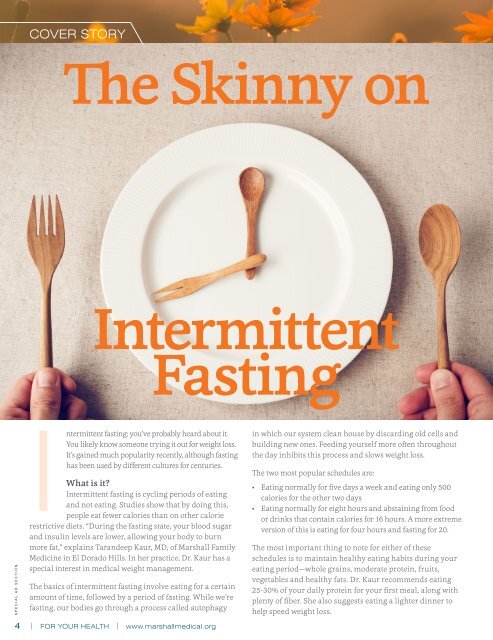Marshall For Your Health, September 2019
For Your Health is intended to provide information about health in general as well as healthcare services and resources available in El Dorado County. Information comes from a wide range of medical experts. If you have any concerns or questions about specific content that may affect your health, please contact your healthcare provider.
For Your Health is intended to provide information about health in general as well as healthcare services and resources available in El Dorado County. Information comes from a wide range of medical experts. If you have any concerns or questions about specific content that may affect your health, please contact your healthcare provider.
Create successful ePaper yourself
Turn your PDF publications into a flip-book with our unique Google optimized e-Paper software.
COVER STORY<br />
The Skinny on<br />
Intermittent<br />
Fasting<br />
SPECIAL AD SECTION<br />
Intermittent fasting: you’ve probably heard about it.<br />
You likely know someone trying it out for weight loss.<br />
It’s gained much popularity recently, although fasting<br />
has been used by different cultures for centuries.<br />
What is it?<br />
Intermittent fasting is cycling periods of eating<br />
and not eating. Studies show that by doing this,<br />
people eat fewer calories than on other calorie<br />
restrictive diets. “During the fasting state, your blood sugar<br />
and insulin levels are lower, allowing your body to burn<br />
more fat,” explains Tarandeep Kaur, MD, of <strong>Marshall</strong> Family<br />
Medicine in El Dorado Hills. In her practice, Dr. Kaur has a<br />
special interest in medical weight management.<br />
The basics of intermittent fasting involve eating for a certain<br />
amount of time, followed by a period of fasting. While we’re<br />
fasting, our bodies go through a process called autophagy<br />
in which our system clean house by discarding old cells and<br />
building new ones. Feeding yourself more often throughout<br />
the day inhibits this process and slows weight loss.<br />
The two most popular schedules are:<br />
• Eating normally for five days a week and eating only 500<br />
calories for the other two days<br />
• Eating normally for eight hours and abstaining from food<br />
or drinks that contain calories for 16 hours. A more extreme<br />
version of this is eating for four hours and fasting for 20.<br />
The most important thing to note for either of these<br />
schedules is to maintain healthy eating habits during your<br />
eating period—whole grains, moderate protein, fruits,<br />
vegetables and healthy fats. Dr. Kaur recommends eating<br />
25-30% of your daily protein for your first meal, along with<br />
plenty of fiber. She also suggests eating a lighter dinner to<br />
help speed weight loss.<br />
4 | FOR YOUR HEALTH | www.marshallmedical.org

















